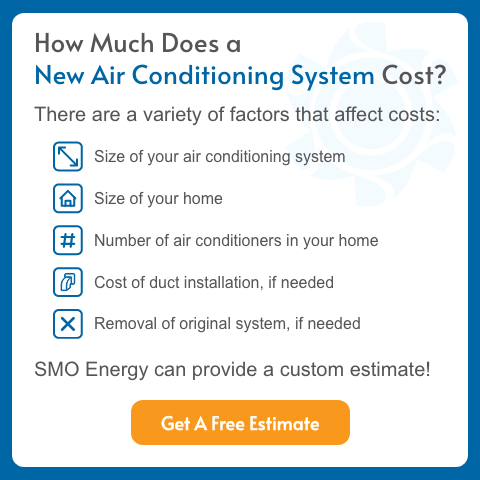Air Conditioners
Find The Right Air Conditioner
For Your Home in Southern Maryland
Whether it is the middle of a heatwave or just a hot, sunny day, your home’s air conditioner works hard to keep your household cool and comfortable. When temperatures heat up, you want peace of mind knowing your cooling system is working properly and operating efficiently. SMO Energy is here to help you find the perfect cooling equipment for your home.
There are many benefits to upgrading to a new air conditioner, such as lowering your energy bills and having more comfortable temperatures throughout your home. If your home does not currently have air conditioning, installing an A/C unit can make a big difference in your household’s comfort. Air conditioning not only cools down the interior of your home, but it also helps to control humidity levels and can improve the quality of the air.
If you are looking for a new air conditioner or are installing A/C in your home for the first time, there are several factors to consider. Some of those factors are size, efficiency and type. The size of your home and the kind of setup you have at home can influence your choice.To help you navigate all of these choices, we offer free in-home energy consultations to have our expert energy consultants help you choose the right equipment to meet your needs. To make purchasing your new equipment even easier, we also offer financing options like 0% financing* and other great payment options.
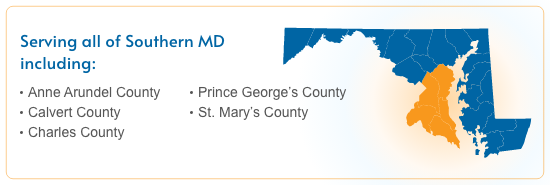
Jump to Key Section
Schedule your FREE AC consultation now
Fill out the form below to have one of our Client Care representatives contact you with more information about finding the right air conditioner for your home, and to schedule your free in-home energy consultation.
10 Signs It Is Time for a New Air Conditioner
In some cases, it is easy to see whether or not it’s time to replace an a/c unit. An air conditioner that is past its prime will not keep your home cool or comfortable the way it once did. These are 10 common signs it is time for a new air conditioning system:
1. Your air conditioner is old.
Older air conditioners are much less efficient than newer models. The Centers for Disease Control and Prevention recommends replacing your air conditioner if it is more than 10 years old. Replacing a 10-year-old model can lead to up to a 40% reduction in your home's cooling costs.
2. Your energy bills are increasing.
Speaking of cooling costs, if your electricity bill seems to be higher than usual, that can be a sign that it is time for a replacement. Older, worn-out units are going to use more energy to cool the air compared to newer units.
3. Some rooms in your house are colder than others.
Older air conditioners do not use the new, advanced multi-speed and variable speed technology that helps with uneven heating and cooling.
4. Your air conditioner runs continuously.
Your air conditioner runs continuously. The temperature rises during the day but the AC never shuts off.
5. The air in your home feels too moist.
A worn-out air conditioner will not be able to control the humidity level in your home as well as a new, functional system. Ideally, the humidity in your home will be somewhere between 30 and 50%. Higher humidity levels create a welcoming environment for mold, while humidity levels that are too low can irritate your airways.
6. You notice an unpleasant odor.
The best odor for your air conditioning system to have is no odor. If you notice a smell, such as a burning odor or musty scent, there is most likely something going wrong with the unit. It could be an electrical issue or that there is mold growth in your ducts.
7. The air coming out of the vents does not feel cold.
If your air conditioner is not producing cool air, it is not doing its job. An A/C system might stop producing cold air for a few reasons, including a problem with the refrigerant or an issue with the compressor.
8. The airflow is weak.
If the air coming out of the vents is not as strong as it once was, you may have a problem with the indoor blower for your AC. Weaker airflow can also mean something is clogging or blocking the ducts. In some cases, you can repair the A/C, but if it is older or regularly has problems, your best option might be to replace it.
9. Your air conditioner is very loud.
All air conditioners make some noise. But if yours is rattling, squealing or banging, something is going wrong. Any new noise should be especially concerning.
10. You need to call a repair company regularly.
If you have the phone number of your air conditioner repair company saved in your contacts because you constantly need repairs, you are likely to save money in the long run by getting a new unit.
Call us today at 888-222-3720
Types of Air Conditioning Systems
Many types of air conditioning systems exist. How much of your home you wish to cool, and the type of system you already have installed at home help determine which system is appropriate for your house. Take a look at some of the most common air conditioning systems.
Central Air Conditioning System
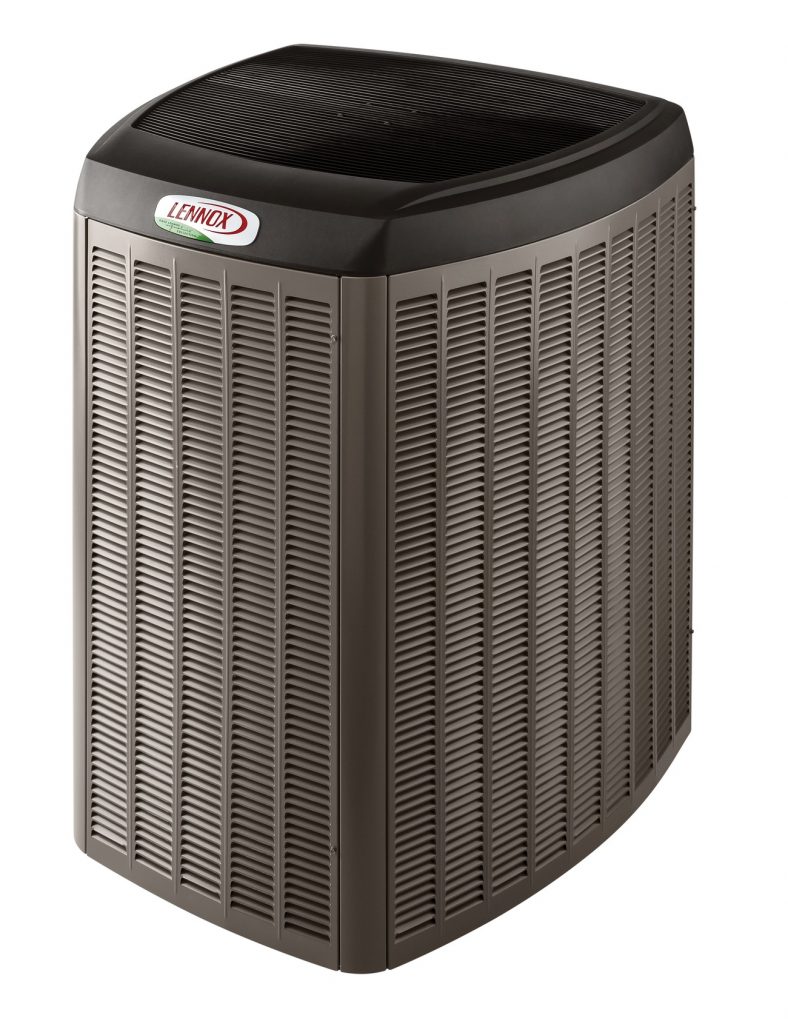
A central air conditioning system sends cold air throughout the home through a series of ducts. The indoor cabinet as an evaporator and a blower to move the air through the ducts. The cooled air travels from the A/C unit through the ducts, into the rooms of your home. The air enters each room through registers on the floor, ceiling or walls. Warm air flows through return registers and ducts from the rooms of your home back to the A/C unit.
Two types of central air conditioning system exist. The first type is a split system, which features a cabinet with the compressor and condenser outside of the house. Inside the house is a second cabinet that has an evaporator. The indoor cabinet is often in the attic. Commonly, split systems are in homes that have an existing furnace but do not have an air conditioner. A supply duct connects to the interior cabinet.
The second type of central air conditioner is a packaged system. Instead of having two cabinets, one indoors and the other outdoors, a packaged central A/C system has the condenser, compressor and evaporator in one outdoor cabinet. The cabinet might be on the roof of a house or placed next to the foundation. Ducts connect to the cabinet through the roof or an exterior wall of the house. Typically, packaged air conditioning systems connect to a furnace or another type of heating system.
If your home already has a central air conditioning system installed, which means you have the necessary ductwork as well, you will most likely replace it with another central air system.
Ductless Mini-Split Air Conditioning System
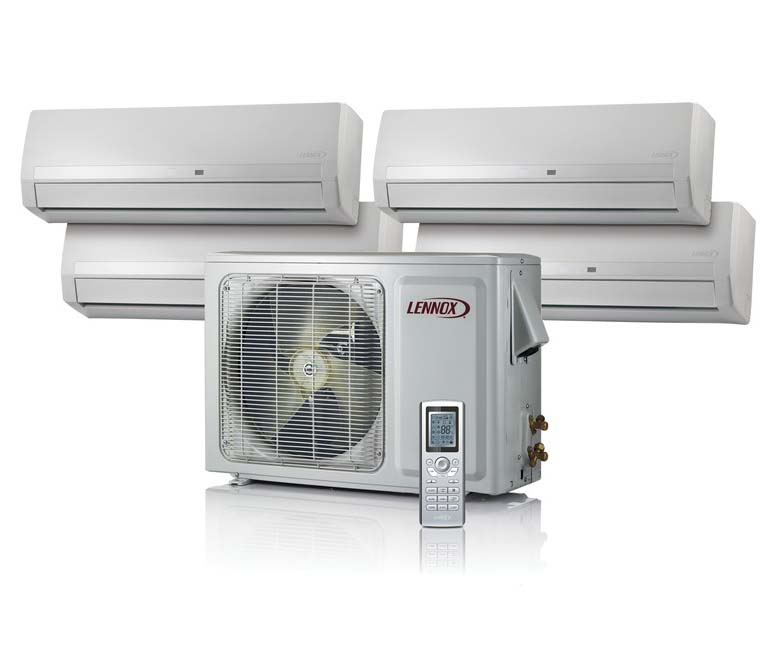
Although some split air conditioning systems are ducted, it is possible to install a ductless split system. A ductless split system features an outdoor compressor and condenser as well as one or more air-handling units, which are indoors. The air-handling unit is typically located on the wall in a bedroom, living room or another interior space.
While central air conditioners provide cooling to the entire house, ductless mini-split systems can cool specific areas. If you choose to install a ductless mini-split system, you install a separate air-handling unit in each room or area you want to cool to create “zones.” Each zone can have individual temperature settings for personalized comfort. If one member of your family likes to keep things chilly while they sleep, they can program the thermostat in their zone to 65 degrees. Meanwhile, you can set your zone to 70 degrees and the living room zone to 78 degrees while everyone is asleep.
Ductless mini-split systems can be easier to install than ducted central air conditioning systems if ductwork isn’t already in place. They can be the right choice for homes that do not currently have air conditioning or for additions to an existing home. Ductless systems can also be more energy-efficient than ducted A/C systems, as there is no energy loss in the ducts. In ducted systems, duct loss can account for up to 30% of energy use. This is especially the case if the ducts are in areas of the home that are not climate-controlled, like an attic.
Room Air Conditioners
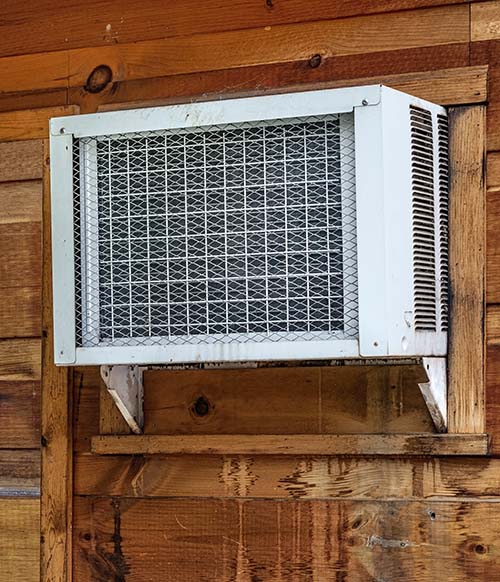
Unlike central air conditioning systems, which cool the entire house, and ductless mini-split systems, which cool zone by zone, room air conditioners cool individual rooms. If your home does not have air conditioning, you might install a room air conditioner in the rooms you use most frequently, such as a bedroom.
Several types of room air conditioners exist. One typical example is a window unit. Part of a window air conditioning unit is located inside of the house while another part is on the outside. Window units vary in size and in the amount of power they use. Typically, you can plug smaller window units into a standard electrical outlet. Smaller window air conditioners are usually better suited for small rooms, like a bedroom or office. Bigger window units often need their own circuit. The largest window units require a dedicated, 230-volt circuit (instead of the 115-volts usually found in U.S. homes). With a window unit, the compressor is inside of the unit, making it the noisiest of options.
The second type of room air conditioner is a portable air conditioner. Portable air conditioners have all of the components housed in a single cabinet that sits on the floor. The air conditioner might be on wheels so that you can move it about with ease. A length of tubing usually stretches from the unit to a window or an opening in a wall to exhaust warm air produced by the air conditioner.
Which type of air conditioner is best for you?
Click the button below to fill out our contact form. One of our Client Care representatives will get in touch with you shortly to schedule your FREE in-home energy consultation. During your consultation, our expert energy consultants will help you decide which type of air conditioner is best for you and your home, and will provide you with a free estimate.
Frequently Asked Questions About Air Conditioning Systems
Looking for more information on choosing an air conditioner for your home in Southern Maryland? Check out the answers to some frequently asked questions.
You are interested in installing air conditioning for the first time or in replacing an existing unit. How do you decide what kind of air conditioner you need? If you are replacing an older system, should you stick with the same type of system or try something new? A few things to consider when choosing a new air conditioner include:
- Your home’s current setup. If you already have ductwork, installing a ducted central air conditioning system will take less time to install. The installation will also cost less than if you need to have ducts installed. If your home does not currently have ductwork, you might prefer a ductless split system.
- How much of your house you wish to cool. Another thing to consider when choosing the type of air conditioner you want is the areas you want to cool. If you only want to cool a small part of your home, you might not need a system that cools the entire house.
- Your budget for a new air conditioning system. Different systems have considerably different price points. If you are on a limited budget, that might influence the options available to you, but keep in mind that most companies will offer financing on new A/C systems.
The right air conditioning system not only determines how comfortable your home feels. It also determines how much you pay to use the system and its overall efficiency. If you are unsure whether a ducted central air conditioning system or a ductless mini-split system is right for you, schedule a free in-home energy consultation. During your consultation, an energy consultant from SMO Energy will listen to what you need and want from your home’s A/C. We will evaluate the setup and size of your house, and we will take your budget into account when making our recommendations to you.
While air conditioners do not come with an expiration or “best by” date, you will likely need to replace the system in your home at some point. The average lifespan of a central air conditioner is about 20 years, but there is a chance that you will want to replace your system before two decades have passed.
Often, it is recommended that you replace an air conditioner after about 10 years. Many air conditioning systems available today are considerably more energy-efficient than models produced a decade ago. That is especially the case with air conditioners that are ENERGY STAR rated. Replacing a 10-year-old air conditioner can help to reduce your energy bills.

How do you know if it is better to repair or replace your A/C? One way to tell if it is time to replace it is to weigh the cost of repair times the age of your system against the price of a new unit. How well you maintain or care for your air conditioning system can also affect its lifespan. Routine maintenance tasks you can perform on your own include cleaning or changing filters and cleaning the condenser coils.
Scheduling an annual inspection and tune-up of your system can also help to prolong the life of your air conditioner and can help it to run more efficiently for longer. SMO Energy offers service agreements that include an annual tune-up and that provide discounted repair services to help you keep your A/C in tip-top shape.
The size of your air conditioner determines how well it can cool your home. Bigger is not always better, especially if you live in a smaller house. An oversized air conditioning system can reduce the indoor air quality of your home and contribute to mold growth. A system that is too big also costs more to run.
Why do oversized air conditioners cost more to operate? They work too well when installed in a smaller home. A big system will cool your house quickly, so rather than running a full cycle, it will shut off once the thermostat reaches the desired temperature. Once the temperature climbs again, it will kick back on. Always starting up and powering down uses more energy than running through a full cooling cycle.
An air conditioning system that is too small for your home will also end up costing you more. Instead of doing the job quickly and shutting off again, an undersized air conditioner will need to run continuously. It may or may not ever bring your home down to the desired temperature.
It is not just the size of your home that influences the size of air conditioner you need. A few other factors can determine the size that will be best for you:
- Sealing and insulation. How well-sealed your home is and how much insulation there is influences the size of your air conditioning system. When recommending a system to you, an energy consultant will consider the envelope tightness and whether or not you have insulation in the walls, floors and ceiling. You can effectively cool a much larger area with a smaller system as long as the house is well-sealed.
- Temperature. How hot it gets in your area also determines the appropriate size of the air conditioner. Warmer climates demand bigger systems, while a smaller A/C unit might be suitable in areas with mild summers.
- Existing ductwork. The location and quality of your home’s existing ductwork also influence the size of your air conditioning system. If the ducts are in non-climate-controlled parts of your home, such as the attic, you probably need a bigger system. If the ducts are well-sealed or are in climate-controlled areas, a smaller system might be appropriate.
- Amount of shade available. Tree cover, the directions your windows face and shade options all influence A/C system size.
- The size of your household. The average human body temperature is just over 98 degrees Fahrenheit. The more people in a house, the harder the air conditioning needs to work in order to cool the space.
- Roof color. Having a dark or light-colored roof can also affect the efficiency of your air conditioner. Dark roofs absorb heat, and light roofs reflect it. You might be able to cool your home with a smaller system if you have a light-colored, reflective roof.
The efficiency of your new system can also influence its size. If you are replacing an older, less-efficient system, you might be surprised to learn that you can effectively cool your home with a much smaller air conditioner.
Along with knowing what variables influence the appropriate size of air conditioner for your home, it can be helpful to understand how A/C systems are classified and sized. The size of a central air conditioning system is measured in tons. Tons, in this case, are different from the unit of weight. When talking about air conditioning, one ton is equivalent to 12,000 British Thermal Units (BTUs). The larger the ton rating, the more powerful the unit.
Usually, residential air conditioning systems go up to five tons in size. Homes that need more than five tons will require multiple systems.
If using the above information to figure out what size air conditioner you need seems complicated, do not worry. You do not have to perform the calculations or figure out the appropriate system size on your own. As part of your energy consultation, we will carefully examine your home and recommend the most suitable system for you based on what we see.
The cost of a new air conditioning system depends on a variety of factors. For example, there is often a difference in price between a central air conditioning system and a ductless mini-split system.
The size of your air conditioning system also affects the cost, as does the size of your home. Bigger systems tend to have higher price tags. If your home is large enough to require two air conditioners, that can also affect the total cost.
Finally, the current set up at your home influences the price of your new system. If you do not have ductwork installed and wish to install a central A/C system, add in the cost of duct installation. If you currently have central air, how much work is needed to remove the original system will change the price of your project.
SMO Energy is happy to provide you with a custom estimate for your home based on the results of an at-home energy consultation.
SMO Energy does offer specials on new air conditioning systems and other equipment. You can find up-to-date information on our discounts and rebates on our specials page.
If you are happy with the service and equipment you receive from SMO Energy, we hope that you will tell your friends and family. As a way of saying thanks, we offer referral bonuses of up to $100 to you and your friends. You can refer as many people as you would like. There is no limit to the referral rewards.
For well-qualified clients, we offer 0% financing or low monthly payment options. With financing, you can enjoy a new air conditioning system in your home for as little as $49 per month.
There are several benefits to replacing your old air conditioning system, including:
- Lower energy bills. Installing a new, energy-efficient air conditioner or a suitably-sized A/C system can lead to a decrease in your energy bills each month.
- Better efficiency. A more energy-efficient system does not just save you money. It is also better for the planet and helps to conserve energy.
- Improved indoor air quality. You can enjoy improved air quality, through better moisture control and filtration, when you install a new air conditioning system.
- Smarter systems. A new A/C system is going to be up-to-date on the latest technology. That means you can use it with smart home devices, such as smart thermostats or smartphone apps.
- Better resale value for your home. If you are considering selling your home soon, upgrading the air conditioning today can mean a higher sale price tomorrow.
- Improved comfort. A new A/C system is likely to work better than an older, worn-out model. It will be better able to cool your home and keep your family comfortable. In the case of a ductless mini-split system, you can control the temperature and comfort level in each individual zone or room. Fighting over the thermostat will be a thing of the past.
A broken air conditioner, especially on a hot summer day, is no fun. Neither is the hassle of having to find a company to repair your equipment. We offer an optional service agreement to help keep your air conditioning system performing at its peak level for many years to come.
Under the service agreement, we will replace the following parts if they become defective during normal wear-and-tear on your A/C system:
- High-Pressure Control
- Starting Capacitors
- Blower Wheel
- Condensate Pump
- Time Delay Relay
- Start Relay
- Blower Motor (up to 1/2 HP; Variable Speed Motors not covered)
- Non-Programmable Thermostats
- Fuses (at unit; no breakers)
- Blower Pulleys
- Outdoor Disconnect
- Blower Shafts
- Blower Bearings
- Blower Drive Belt
- Hard Start Capacitor
- Condenser Fan Motor (up to 1/2 HP; Variable Speed Motors not covered)
- Low-Pressure Control
- Fan Blades
- Rain Shield
- Wiring in the Condensing Unit
- Fan Brackets
- Running Capacitors
- Contactor
- Fan Centers
- Solid-State Controls
- Control Transformer
- Fan Relay
The service agreement also offers discounted labor rates and a free annual tune-up and inspection of your system. Regularly inspecting and tuning up your system will help to ensure that it continues to operate efficiently and will help you continue to enjoy lower energy bills. Maintaining your A/C system can also extend its life.
View the Central Air Conditioning Service Agreement
SMO Energy is proud to offer up to a 10-year warranty on all new equipment purchases. If you would like, you can extend your warranty with an optional service agreement.
SMO Energy is a total home comfort provider servicing Southern Maryland. We work with clients in the following counties:
- St. Mary’s
- Anne Arundel
- Prince George’s
- Charles
- Calvert
We have offices in La Plata, Prince Frederick and Glen Burnie, Maryland. Our live client care representatives work out of our La Plata location.
In addition to installing or replacing central air conditioning or ductless mini-split systems in your home, we also provide complete service for it. We offer A/C maintenance, annual tune-ups and repairs. At the first sign that something is not right with your air conditioner, give us a call to schedule an appointment with one of our NATE-certified technicians.
Our technicians have passed the North American Technician Excellence exam and certification program, demonstrating extensive knowledge of HVAC systems. They also complete hours of training each year to keep their skills sharp and to develop new working knowledge of cooling and heating systems.
You can count on our team to go above and beyond when tuning up, maintaining or repairing your equipment.
Schedule Air Conditioning System Service
Yes! We are a total home comfort provider. That means we offer both heating and cooling equipment and provide full service to make sure your home’s equipment is working at its best. In addition to central air conditioning systems and ductless mini-split systems, we offer:
In addition to our heating and cooling systems, we also provide indoor air cleaning systems. Indoor air cleaning systems help to purify the air in your home and allow your family to breathe easier.
Air Conditioning Services We Offer
Summer Deals On Lennox Equipment
From July 8th – August 16th, SMO Energy is offering the following rebate and financing options for Lennox equipment.
Higher Rebate “OR” Financing: Offering rebates up to $1,500 on the Ultimate Comfort System™ OR offering Qualified Buyers no payments, no interest for 12 months when financing a new Lennox® system.
Moderate Rebate “AND” Financing: Offering rebates up to $1,200 on the Ultimate Comfort System™ AND offering Qualified Buyers no payments, no interest for 12 months when financing a new Lennox® system.
Why Choose SMO Energy for Air Conditioner Replacement and Installation?

Your home’s air conditioner has a big job to do in keeping your home comfortable during a Southern Maryland summer. It is essential to choose a system that is suitable for the size and structure of your house for the system to work well.
Understanding the types of air conditioners out there will help you choose the best option for you. It is also worthwhile to understand how factors such as your home’s size, envelope and location also affect your air conditioning decisions. Picking out the right air conditioner can seem challenging, but the energy consultants at SMO Energy are here to streamline the process and provide assistance.
SMO Energy is a full-service heating and cooling company that has been providing Southern Maryland, Anne Arundel County, and Prince George’s County with total home comfort solutions for generations. Whatever your air conditioner needs may be, we have you covered.
We offer the following air conditioning services:
- Air conditioner repair
- Air conditioner replacement and installation
- Annual air conditioner maintenance
- Air conditioner system maintenance and servicing
- Quality equipment options
- Dependable service from NATE certified technicians
Our energy consultants provide free in-home appointments and estimates to help you choose the best air conditioner for your home. We offer 0% financing on new equipment for qualified clients to make the process of purchasing your new equipment even easier.
Whether you are looking to repair, replace, or upgrade your home cooling equipment, we are here to help you find the right options for your home and budget.
Contact us today for more information or to schedule your energy consultation.
Learn More About Air Conditioning
Request Your Free Estimate
We provide FREE in-home energy consultations to evaluate your current cooling system and help you choose the best air conditioner for your home.
*Financing subject to credit approval.


